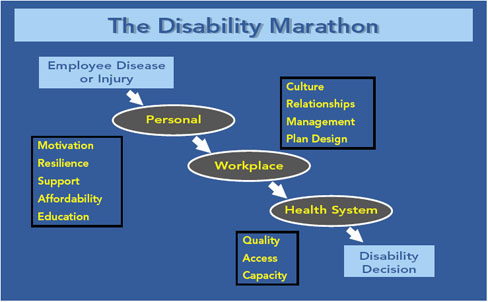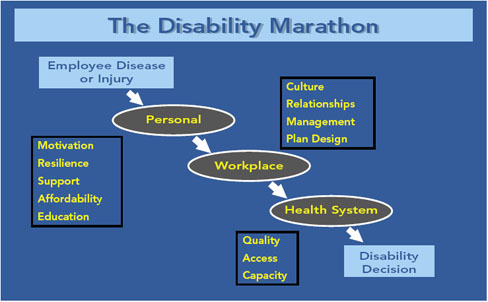
Erhard W. Busse, MD
|
bh IN BRIEF
Managing mental illness claims requires a broader approach that considers not only the disease, but an array of causal and contributing factors. For example, most claim files involve important workplace structure and interpersonal issues that must be addressed. Together, these will influence medical, family and vocational outcomes.
Advisors can use experience gained across their entire client base to compare and contrast employer practices that influence recovery and return to work. Advisors can also use complementary professional networks on the most challenging cases…and to develop a prevention strategy that includes solid human resource management policies and practices.
|
A Better Model for Mental Health Claim Management
During my early training in psychiatry, the general framework for organizing knowledge and understanding complexity came from General Systems Theory. This allowed medicine, and especially psychiatry, to escape the confinement of linear causality. Briefly, General Systems Theory looks at the complex interaction of multiple factors in creating a certain outcome, such as medical disability. This multi-dimensional framework creates two distinct advantages:
Better Process, Better Outcomes
In this era of evidence-based medicine, claimants are generally getting better medical care, but the lessons learned from General Systems Theory have not yet entered the mainstream of medical practice. The realities of a volume driven, fee-for-service health care system continue to create silos, with little communication between providers and employers.
However, our systems-level framework, or strategy, allows us to integrate medical, family and vocational "silos" and see the bigger picture. It underscores the fact that how health care is delivered can be just as important as what (a drug, an operation, etc.) is delivered. We can begin to understand how one problem (a disease/disability) can sometimes be a solution to a perceived worse problem (e.g., an unsuitable job; an intolerable relationship with a supervisor or spouse). Rather than the elimination of all symptoms, the model allows us to consider many causal and contributing factors in the quest for improved claimant function and early return to work.

Managing the Workplace Dimension
In my own work in consulting and providing opinions on LTD claim files, 70% to 90% of files I review involve significant workplace issues. Few physicians have a process for informing themselves of workplace/personal/financial issues impacting a claimant’s choice to pursue medical disability. The concept of choice is a key issue in understanding medical disability. Managing such a choice is obviously easiest early in the process, but once the choice decision has been made, the process can take on a life of its own. A line in the sand is drawn, and various stakeholders begin to take sides. Finding solutions in such a potentially adversarial scenario requires great skill.
The Emerging Advisor Role
These considerations naturally lead to recognition of the critical role of advisors. Different employers, even in the same industry, experience very different incidence rates of medical disability. Again, multiple causal factors are at play here, including predominant gender and age of the workforce, type of work, and many issues relating to human resources policies and the actual management of medical problems and absenteeism.
Advisors can add value by ensuring clients are adopting "best practices" in the areas of performance management, attendance and disability management, and dealing with workplace conflict. They can assist employers in building the business cases for implementing these best practices. They can perform audits that highlight the causal factors involved in employee disability claims.
Not all advisors can do all things, and many plans have such infrequent or short-term claims that complex management strategies may not be necessary. But chances are, over just a few years, even small plans are likely to experience a sensitive claim with a workplace-related mental health cause or complication. In those cases, advisors can serve a client’s interest by locating, screening and negotiating service agreements with third-party vendors skilled in disability prevention and management strategies. Those skills are a great complement to the plan design, financing, and relationship expertise that is the hallmark of a great benefits advisor.
|
Categories: Doctor On Call
